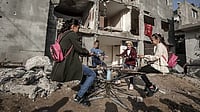We met for an interview during breaks from campaigning at Vikhroli, where a visibly tired Medha seemed more out of place with the English media journalists than the street. Volunteers come and go, taking long instructions, as she sits behind a table in a small 10x4 room, laden with AAP newspaper cuttings, posters and banners.
There is a general middle-class and media perception that is anti-slum, and the only people fighting against the builder lobby are the working class and the poor. How would your housing policy move beyond these?
Those fighting the builder lobby are not only the working class and poor. We are fighting mhada redevelopment. All middle-class people—government officials, government servants, bank employees—are with us. We are fighting other redevelopment projects. Everywhere people are cheated. The Catholic properties in the heart of the city are grabbed by builders.
How would you defeat this perception?
We are holding meetings in societies and raising these questions. And the confirmation I get is in their saying “we need your kind of fighting spirit”. They know they can’t fight these battles. Even the Campa Cola people came to us. So everyone seeks support; not just people in slums. And it’s only through the media that we can defeat the perception. And we’re not so strong in social media. Abhi do din pehle mujhe maloom pada WhatsApp kuchchh cheez hai. And someone told me you can put in a 25-second message, and I can’t even give a speech less than 25 minutes.
Your constituency, especially around Ward M, is also known as the dumping ground of people, owing to all the displaced people, has a high prevalence of juvenile delinquency and violence against women. Are you going to address this issue with your constituency and the general public?
We have to come to a position. Women’s rights, though we are actually empowering women through the movements, their participation itself is their way out of drudgery and insecurity. Once people become secure themselves, they don’t have to beg for external security forces. And the recommendations of the Justice Verma committee should be implemented, which has not happened so far. There is no political will, but there is social will, and people know they don’t have to beg before politicians, they can demand better governance, and much will be achieved when people say they will govern themselves. That change, whether at the level of women or the community, comes through self-reliance.
And what about policing? Just this January 21, a 22-year-old Muslim died in custody, and a Dalit man four months ago after an altercation outside a restaurant. There is a breakdown of trust between people and the police.
The police as an institution is a problem because it is corrupt from top to bottom. Only after mass action did they go for a second post-mortem in the cases of custodial deaths. We cannot do without the police, but communities can have a security mechanism of their own, not like a parallel army, but by strengthening community relationships.
Mumbai has a long legacy of Ambedkarite politics and working class struggles, exemplified by the Ghar Bachao Ghar Banao Andolan. Arvind Kejriwal may have taken a stand on contract labour but some radicals in the movement are uncomfortable with the language of AAP. How do you see these contradictions and how will you deal with them?
See, these are just allegations; the questioning is based on the lack of knowledge. The other day I told Arvind Kejriwal to take a clear stand in support of reservation at Kannawaram Nagar in Vikhroli. There are lots of strange situations, with Marathas asking for reservation and Brahmins asking for it, and even with Muslims, not every movement is in support of quotas. And Dalit Muslims must get reservation as per Article 341. As for people’s movements, we have taken strong positions. Everywhere in the country, in all movements, there are mismatches and differences. I personally don’t fear this. Our conscience and commitment is what matters, there are disagreements in all families. But no doubt a common minimum agenda must be developed.


























